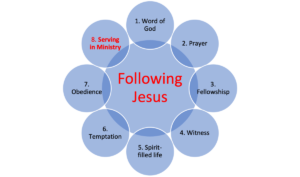Expanding Leadership in Contextual Ecclesiology
Contextual Description:
In Matthew 9:37, we find a moment where Jesus tells His disciples that the harvest is plentiful but the works are few. The words of Jesus really resonate with me as someone who has been in pastoral ministry for many years. I have consistently observed a significant need within the ecclesial context – a need that far exceeds the number of individuals willing to step forward as servants. My context of ministry is at St. Paul Methodist Church of Elkton Michigan, in a small rural community near Lake Huron. Over its 140 years of history, St. Paul Methodist Church has been recognized as one of the most active growing Methodist churches in Huron County. However, the past decades, a discernible trend has emerged, signaling a critical influence on the overall decline of the church. According to our historical archives of our church, there seems to be three major reasons behind this trend; relocations of church members, aging congregation and fail to invest in next-generation ministry. I believe this downward trend appears to have persisted for many years, and has fostering a culture of undermining both service and leadership within the church. Despite an upswing in membership over the last couple years, a persistence challenge of finding dedicated servants in various ministry still remains critical. Why do people refrain from taking leadership within their church to actively engage in service? How can the concept of leadership be expanded in our ecclesial context, so that more people are aware that they are called to serve and lead?
 Photo by Andrew – Inside & Insight
Photo by Andrew – Inside & Insight
Without Following, We can not Lead
To address these questions, I emphasize the importance of seeking genuine rest over simply working. So what is that mean? The church is more than a venue for labor; it serves as a sacred place where we partake in the true Sabbath rest. Work becomes untenable without such rest. Authentic rest emerges from a deep and personal connection with Jesus Christ. Serving effectively is contingent upon establishing this foundational relationship. Thus, sincere service is predicated on a genuine following of Jesus. After all, truly following Jesus is the beginning of faithful service, and genuine discipleship is the opening of authentic leadership. This means there is an indispensable relationship that extends from the followership of Christ to discipleship and leadership. The biblical figure who emerged as an unparalleled servant following Jesus is arguably Peter. Coming from Galilee, Peter, a fisherman, underwent a profound transformation after encountering Jesus. When Jesus calls for Peter, He commands him to “follow me” (discipleship) and then continues, “I will make you a fisher of men” (leadership), another compelling example that the role of becoming fishers of people does not precede the imperative of following Jesus. Our priority is not serving or leading but following Jesus Christ first. Another excellent example is that delving into the life and ministry of John Wesley, who forms the foundation of the Methodist movement, illustrates how a life following Jesus leads to a position of service. The transformative juncture in Wesley’s spiritual journey that transpired during the Aldersagte event in 1738. Wesley experienced the power of the Holy Spirit moving in his heart as he listened to a reader reciting the preface to Luther’s commentary on the Book of Romans. This pivotal Aldersgate event marked a turning point for Wesley, inspiring him to follow Jesus deeply that expanded into nurturing disciples by forming United Society which was aimed to nurture and strengthen laity ministry.
Without Discipleship, We can not Serve
As I was researching the correlation between discipleship and leadership, it gave me a rationale for implementing practical tool; one to one discipleship training, that is needed to further activates service in the church. Of course, a disciple training manual does not automatically create disciples. The discipleship training is a deliberate and gradual nurturing process that requires patience and total trust in the work of the Holy Spirit. This training program, outline in the chart below, spans eight weeks, with two-hour sessions scheduled weekly. Each session is meticulously designed for profound and comprehensive exploration. These topics include; Word of God, Prayer, Fellowship, Witness, Spirit-filled life, Temptation, Obedience, Serving in Ministry. The primary objective is to foster a life of discipleship, serving as a compass to aid individuals following Jesus in leading lives dedicated to ministry and service. Upon completion of the eight-week training, participants will transition into the role of “shepherd,” entrusted with guiding their designated “flock” in one-to-one discipleship meetings, where they will facilitate the continuation of the training process.
Photo by One to One Discipling
On the way to Leadership
My research project began with the question of why people do not serve in the church. I believe serving within the church is very important. Those who follow Jesus will serve and love the church. However, through my research, I was compelled to believe that serving within the church does not fulfill God’s mission. Individual undergoing transformation and renewal embody a life of serving that extends beyond the ecclesiastical realm, leaving indelible imprints of Christ’s presence wherever they go. We must be careful not be become church-centric individuals who perceive their church as exclusively special place. While advocating for service within their local church, it is equally vital to serve in various places in our society. The point is that our emphasis must shift from mere service to the profound importance of authentic discipleship, intentionally establishing deep intimate relationship with Jesus in a daily basis. The church is not merely a place of work; it is a place where we find Sabbath, rest in God’s presence. Only then is ministry and service possible. The church does not exist solely for the purpose of serving itself. It is a community with a sacred calling to reach out to those who are hurting, suffering, and crying in the world.
Further Reading:
Durrano Press, One to One Discipline: Not a Self-Centered Christian but a Christ-Centered Christian. Seoul, Korea: Durrano Publishing, 2014.
James Montgomery Boice, Christ’s Call to Discipleship. Grand Rapids, MI:Kregel Publication, 2013.
Henry J.M. Nouwen, Following Jesus: Finding Our Way Home in an Age of Anxiety. New York, NY: Convergent Books, 2019.
Os Guinness, The Call: Finding and Fulfilling the Central Purpose of Your Life. Nashville, TN: Thomas Nelson, 2003.


